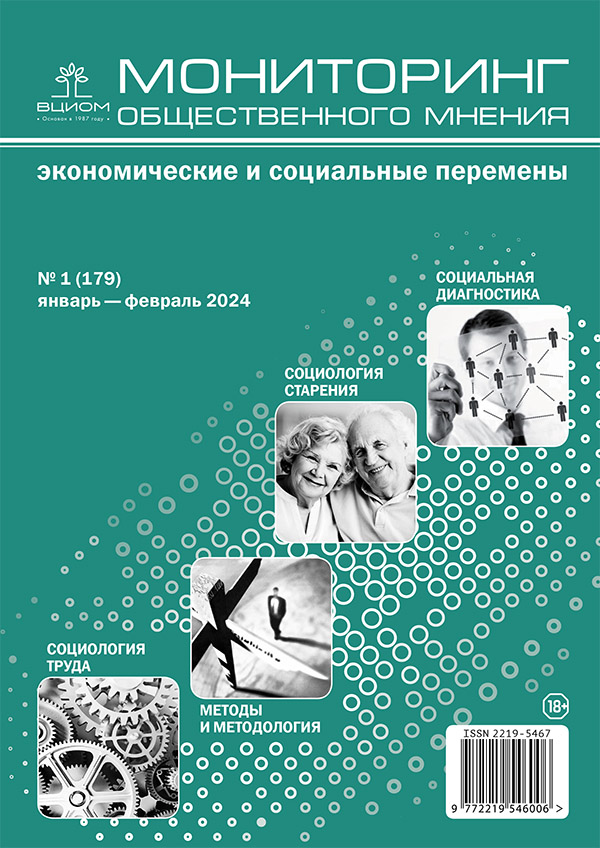Using the Method of Incomplete Sentences in Studying the Images of the “Hero” and “Anti-Hero” of Our Time
DOI:
https://doi.org/10.14515/monitoring.2024.1.2460Keywords:
hero of our time, antihero, method of incomplete sentences, pyramid of generalizations, types of heroes, types of antiheroesAbstract
The article describes the results of an experiment on using the method of incomplete sentences in studying the issues of heroism among high school students. Based on a large amount of empirical material (questionnaires of more than 10 thousand schoolchildren in the Leningrad region), the author analyzes the communicative and cognitive adequacy of using incomplete sentences, considers the specifics of the administrative context of the sample and its impact on the data, paying special attention to the quality of the data obtained. The author provides the structure of the concepts “hero of our time” and “antihero of our time” in the ideas of schoolchildren, the pyramid of generalizations, and proposes a typology of heroes and antiheroes, formed on the basis of the main semantic characteristics identified in the process of analyzing empirical data. The proposed types are primarily based on the social function of the hero and antihero of the time. Based on the analysis, the author concludes that an incomplete sentence is a working tool for determining the structure of a concept, which makes it possible to obtain meaningful material with an acceptable number of irrelevant answers.
Acknowledgments. The author thanks Maxim Pavlov for his critical view and valuable comments on the manuscript of this article.
References
Бурлов А.В. Метод неоконченных предложений в социологии: стратегии использования и логика анализа данных. Диссертация на соискание ученой степени кандидата социологических наук. М.: ИС РАН, 2001.
Burlov A.V. (2001) The Method of Incomplete Sentences in Sociology: Usage Strategies and Logic of Data Analysis. PhD Thesis. Moscow: Institute of Sociology of the Russian Academy of Sciences. (In Russ.)
Желизнык М.Н. «Герой нашего времени» в представлениях молодежи Ленинградской области. Методологические размышления // Socio Time / Социальное время. 2022. № 3. С. 57—71. https://www.doi.org/10.25686/2410-0773.2022.3.57.
Zheliznyk M.N. (2022) A Hero of Our Time for the Young People of the Leningrad Region. Methodological Thinking. Socio Time. No. 3. P. 57—71. https://www.doi.org/10.25686/2410-0773.2022.3.57. (In Russ.)
Зимбардо Ф. Эффект Люцифера. Почему хорошие люди превращаются в злодеев. М.: Альпина нон-фикшн, 2018.
Zimbardo F. (2018) Lucifer Effect. Understanding How Good People Turn Evil. Moscow: Alpina Non-Fiction. (In Russ.)
Климова С.Г. Опыт исследования методики неоконченных предложений в социологическом исследовании // Социология: методология, методы, математическое моделирование (4М). 1995. № 5—6. С. 43—64.
Klimova S.G. (1995) The Experience of Using the Methodology of Unfinished Sentences in a Sociological Study. Sociology: Methodology, Methods, Mathematical Modeling (4М). No. 5—6. P. 43—64. (In Russ.)
Пахомов А.П. Методика «незаконченные предложения» Сакса — Леви как учебное пособие // Экспериментальная психология. 2012. Т. 5. № 4. С. 99—116.
Pakhomov A. P. (2012) The Sentence Completion Test (Sacks & Levy) as a Training Manual. Eksperimental'naâ psihologiâ = Experimental Psychology (Russia). Vol. 5. No. 4. P. 99—116. (In Russ.)
Плахов В.Д. Герои и героизм: опыт современного осмысления вековой проблемы. СПб.: КАРО. 2008.
Plahov V.D. (2008) Heroes and Heroism. Current Understanding of the Centuries-Old Problem. Saint Petersburg: KARO. (In Russ.)
Рягузова Е.В. Герой как культурное означающее // Известия Саратовского университета. Серия «Акмеология образования. Психология развития». 2014. Т. 3. № 2. С. 122—125. https://doi.org/10.18500/2304-9790-2014-3-2-120-125.
Ryaguzova E.V. (2014) Hero as a Cultural Signifier. Izvestiya of Saratov University. Educational Acmeology. Developmental Psychology. Vol. 3. No. 2. P. 122—125. https://doi.org/10.18500/2304-9790-2014-3-2-120-125. (In Russ.)
Сикевич З.В. Опыт применения процедуры неоконченных предложений в социологическом исследовании // Вестник Санкт-Петербургского университета. Социология. 2019. Т. 12. №. 4. С. 317—328. https://doi.org/10.21638/spbu12.2019.402.
Sikevich Z.V. (2019) The Experience of Applying the Procedure of “Unfinished Sentences” to Sociological Research. Vestnik of Saint Petersburg University. Sociology. Vol. 12. No. 4. P. 317—328. https://doi.org/10.21638/spbu12.2019.402. (In Russ.)
Субботина М.В. Теоретическая и эмпирическая трактовка героизма в социологии (на примере кинематографических репрезентаций). Диссертация на соискание ученой степени кандидата социологических наук. М.: Российский университет Дружбы народов. 2021.
Subbotina M.V. (2021) Theoretical and Empirical Interpretation of Heroism in Sociology (on the Example of Cinematic Representations). PhD Thesis. Moscow: RANEPA. (In Russ.)
Татарова Г.Г., Бурлов А.В. Логическая организация анализа данных, полученных методом неоконченных предложений // Социологические исследования. 1999. № 8. С. 123—133.
Tatarova G.G., Burlov A.V. (1999) Logical Organization of Data Analysis Obtaining by the Method of Incomplete Sentences. Sociological Studies. No. 8. P. 123—133. (In Russ.)
Allison S.T., Goethals G.R. (2011) Heroes: What They Do and Why We Need Them. New York, NY: Oxford University Press.
Drake Ph., Miah A. (2010) The Cultural Politics of Celebrity. Cultural Politics. Vol. 6. No. 1. P. 49—64. https://doi.org/10.2752/175174310X12549254318746.
Franco Z., Blau K., Zimbardo P. (2011) Heroism: A Conceptual Analysis and Differentiation between Heroic Action and Altruism. Review of General Psychology. Vol. 15. No. 2. P. 99—113.
Keczer Z., File B., Orosz G., Zimbardo P.G. (2016) Social Representations of Hero and Everyday Hero: A Network Study from Representative Samples. PLoS ONE. Vol. 11. No. 8. P. 1—17. https://doi.org/10.1371/journal.pone.0159354.
Kinsella E. L., English A., McMahon J. (2020) Zeroing in on Heroes: Adolescents’ Perceptions of Hero Features and Functions. Heroism Science. Vol. 5. No. 2. Art. 2. https://doi.org/10.26736/hs.2020.02.02.
Povedak I. (2009) Heroes and Celebrities. PhD Dissertation Summary. Budapest: Szeged. URL: http://doktori.btk.elte.hu/folk/povedakistvan/thesis.pdf (accessed: 10.12.2023).
Sullivan M.P., Venter A. (2010) Defining Heroes Through Deductive and Inductive Investigations. The Journal of Social Psychology. Vol. 150. No. 5. P. 471—484. https://doi.org/10.1080/00224540903366602.
Trotsuk I.V., Subbotina M.V. (2021) Three Questions to Start the Sociological Study of Heroism. RUDN Journal of Sociology. Vol. 21. No. 1. P. 169—180. https://doi.org/10.22363/2313-2272-2021-21-1-169-180.
Downloads
Published
How to Cite
Issue
Section
License
Copyright (c) 2024 Monitoring of Public Opinion: Economic and Social Changes Journal (Public Opinion Monitoring) ISSN 2219-5467

This work is licensed under a Creative Commons Attribution-NonCommercial-ShareAlike 4.0 International License.






